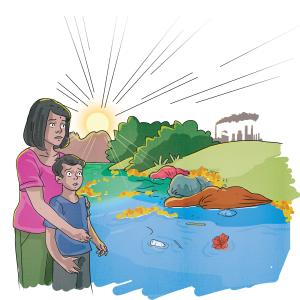
A few kids were tracking their paper boat in a river. Who was to say they would discover dirty truths.

As millions gather for Maha Kumbh 2025, can we ensure our rivers remain clean? Aarav’s journey reveals the urgent need to protect our sacred waters from pollution and neglect.

Dive into River Tales, Festivals, and a DIY Splash—just bring water, petals, and mud!

Performing tangible actions to achieve credible solutions—making eco-friendly cleaning agents and raising awareness on chemically-intense products to control pollution. ******************************************************************************** The unsettling sight of the Bellandur Lake—a foamy, cloudy demon gargling bubbles—and plastic litter—baffling mounds disposed irresponsibly—motivated me to act and revive our wonderful world. We all know that the climate crisis is going off the charts and the practise of ‘Reduce, Reuse, and Recycle’ is gaining alarming urgency. Thus, it&…

A refreshingly sweet and innocent observation by a child of an otherwise very worrying issue of—river pollution—with a heartwarming appeal for water conservation. Once upon a time, during the holidays, I was travelling from Delhi to my village nearby. On the way, we guys came across the Yamuna River. Looking at the river, my younger brother instantly commented, “It doesn’t snow in Delhi even during winters. But here, on the river, it seems to have snowed in peak summers!”... Then, I explained to him that the white foam on the river surface is not snow but the chemical effluents emitted by huge …

In summers this year, some European rivers had dried substantially, causing drought in many parts of the region. It revealed to their surface, some ancient stones with intricate engravings on them. Their markings used to indicate the water-level of these rivers, which served as a common forecasting tool for famines. Such stones were called hunger stones. One such is disclosed at the banks of the Elbe River. Dated to 1616 AD, its rock is etched with a warning in German...

A Freedom Pledge on water—a promise to conserve every drop for our present, before we even reach the future. ************************************************************************************* My friends call me ‘Water Maniac’. They say I suffer from a ‘reverse’ hydrophobia— perennially worried about water. Basically, dreading the prospect when we won’t have any of it…

The managment of silt washed down by the Himalyan rivers are key to mitigating flood risk in vulnerable regions across India There are different methods to manage silt load. Soil conservation methods like crop rotation, use of organic matter, contour cultivation and restricted land use are some of the recommended methods of silt managment, especially in the catchment areas of rivers.

The coastal state of Maharashtra has three major rivers and several lakes, making it one of the few states in India having a vast water bank. However, most of its water bodies, including the Godavari, Krishna and Tapti rivers, are so polluted that they look like nullahs or drains. Heard about the Jayanthi and Gomati nullahs of Kolhapur? Well, according to water conservationist Rajendra Singh, they were once a water source but today we call them nullahs.

